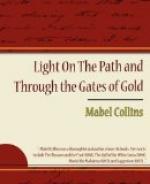Granting, then, for the sake of this argument, that man is a powerful consciousness who is his own creator, his own judge, and within whom lies all life in potentiality, even the ultimate goal, then let us consider why he causes himself to suffer.
If pain is the result of uneven development, of monstrous growths, of defective advance at different points, why does man not learn the lesson which this should teach him, and take pains to develop equally?
It would seem to me as if the answer to this question is that this is the very lesson which the human race is engaged in learning. Perhaps this may seem too bold a statement to make in the face of ordinary thinking, which either regards man as a creature of chance dwelling in chaos, or as a soul bound to the inexorable wheel of a tyrant’s chariot and hurried on either to heaven or to hell. But such a mode of thought is after all but the same as that of the child who regards his parents as the final arbiters of his destinies, and in fact the gods or demons of his universe. As he grows he casts aside this idea, finding that it is simply a question of coming of age, and that he is himself the king of life like any other man.
So it is with the human race. It is king of its world, arbiter of its own destiny, and there is none to say it nay. Who talk of Providence and chance have not paused to think.
Destiny, the inevitable, does indeed exist for the race and for the individual; but who can ordain this save the man himself? There is no clew in heaven or earth to the existence of any ordainer other than the man who suffers or enjoys that which is ordained. We know so little of our own constitution, we are so ignorant of our divine functions, that it is impossible for us yet to know how much or how little we are actually fate itself. But this at all events we know,—that so far as any provable perception goes, no clew to the existence of an ordainer has yet been discovered; whereas if we give but a very little attention to the life about us in order to observe the action of the man upon his own future, we soon perceive this power as an actual force in operation. It is visible, although our range of vision is so very limited.




